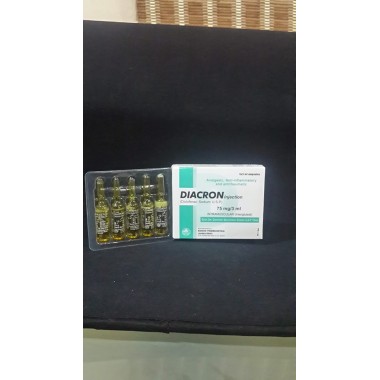.Diacron rn is indicated for relief of the signs and rn symptoms of osteoarthritis, rheumatoid arthritis and ankylosing spondylitis.
Package Leaflet: Information for the Patient
Diclofenac 75 mg / 3 ml Solution for Injection
Diclofenac Sodium
Diclofenac Injection is provided as a solution for injection, containing 75 mg Diclofenac sodium in 3 ml,
to be given by intramuscularly ( into a muscle) or intravenously (into a vein) as an infusion.
Diclofenac Injection is indicated for the treatment of painful conditions, such as kidney stone pain,
osteoarthritis (degeneration of joints) and rheumatoid arthritis (inflammation of joints), back pain, gout
(formation of crystals in joints), injuries and fractures in children aged over 12 years, adults and older
patients.
Diclofenac Injection is not recommended for use in children.
Older people
�Older people have increased frequency of adverse reactions to NSAIDs especially gastrointestinal
bleeding and perforation which may be fatal. Caution should be advised in patients receiving concomitant
medications which could increase the risk of ulceration or bleeding, such as oral corticosteroids,
anticoagulants such as warfarin, selective serotonin-reuptake inhibitors (SSRIs) or anti-platelet agents
such as aspirin.
Other medicines and Diclofenac Injection
Tell your doctor, nurse or pharmacist if you are taking or have recently taken any other medicines. This
includes any herbal products or medicines bought without a prescription.
• Digoxin (used to treat heart problems)
• Lithium (used to treat mental illness)
• Antibiotics called quinolones (such as ciprofloxacin)
• Ciclosporin and tacrolimus (used to treat some inflammatory diseases and after transplants)
• Methotrexate (used for some inflammatory diseases and cancers)
• Drugs that can increase your risk of bleeding, sometimes given if you have heart problems, such as
dipyridamole or clopidogrel
• Diuretics (water tablets)
• Medicines to treat high blood pressure
• Mifepristone, used to terminate pregnancy (including if you have taken it within the last 12 days)
• Medicines to treat diabetes
• Oral steroids (an anti-inflammatory drug)
• Steroids
• Zidovudine (treatment of HIV infection)
• Phenytoin (medicines to treat epilepsy)
•Colestipol and cholestyramine(medicines to lower cholesterol level)
•CYP2C9 inhibitors: e.g Sulfinpyrazone and voriconazole
• Other NSAIDs (for painful or inflammatory conditions) including COX2 inhibitors
• Medicines known as SSRIs used to treat depression, such as paroxetine or fluoxetine
• Medicines used to treat heart conditions or high blood pressure for example beta-blockers or ACE
inhibitors.
Pregnancy, breast-feeding and fertility
If you are pregnant or breast-feeding, think you may be pregnant or are planning to have a baby, ask your
doctor for advice before taking this medicine.
Pregnancy
Diclofenac Injection should only be used during pregnancy when your doctor decides the benefits to you
are greater than any possible risk to the unborn baby.
Do not take Diclofenac Injection during the last 3 months of pregnancy as it may affect your baby’s
circulation and kidneys.
Breast-feeding
Do not take Diclofenac Injection during breast-feeding as diclofenac passes into the breast milk in small
amounts.
Fertility
Taking Diclofenac Injection may make it more difficult to conceive. You should talk to your doctor if
you are planning to become pregnant, or if you have problems getting pregnant.
�Driving and using machines:
Diclofenac Injection may make you feel drowsy or dizzy, or cause headaches or problems with vision. If
you are affected, do not drive or operate machinery.3
Diclofenac Injection contains less that 1 mmol (23 mg) sodium per 3ml i.e. essentially sodium-free.
Diclofenac Injection contains sodium metabisulphite which can cause severe allergic reactions,
especially in patients with a history of asthma or other allergies.
3. How you are given Diclofenac Injection
Diclofenac Injection can be given by deep injection into the large muscle of the buttock. The usual dose is
one ampoule once daily. One ampoule twice daily may be required in severe cases, the second dose being
injected into the buttock muscle on the other side.
The injection should not be given for more than 2 days. For colicky pain from the kidney area the dose is
one ampoule injected into the buttock muscle and this dose may be repeated after 30 minutes if necessary.
The total dose in one day should not exceed 150mg (two ampoules).




